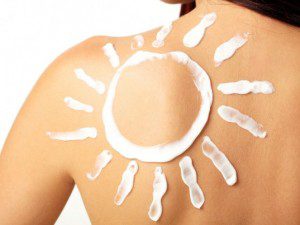Guest Writer for Wake Up World
Day in and day out, your skin gets exposed to harmful toxins. Because of that, you want to protect it. And just in case you aren’t as careful with skin care as you should be, I want to share these 5 facts about your skin so you can get a better idea of what it’s exposed to on a daily basis.
5 Basic Skin Facts You Should Know
Your skin is the largest organ of your body, and it is under constant assault by a variety of environmental toxins. UV light from the sun, pollution, and chemicals in our water can all take their toll. Here are a few skin facts you should know, including how to protect it.
[pro_ad_display_adzone id=”110028″]
1. Indoor Tanning Increases Cancer Risk
Many people already suspect indoor tanning is dangerous; in fact, there’s a growing body of evidence suggesting that it can lead to cancer. A recent review examining current literature on tanning beds noted: “…tanning beds account for as many as 400,000 cases of skin cancer in the United States each year.” [1] And while there are other factors involved in a cancer diagnosis, high doses of UV light from tanning and a person’s age could be big contributors. The World Health Organization (WHO) found indoor tanning “before age 30 was associated with a 75 percent increase in the risk of melanoma.”[2] Even the FDA has finally recognized tanning beds as harmful. [3] Especially for kids and young adults. Given that fact, it’s a little disconcerting that over half of the nation’s top colleges still offer tanning beds on- or off-campus. [4]
2. It Might Be Best to Avoid Tattoos
You might want to think twice about that tattoo — not because it will upset your mother, but recent reports from New Zealand have suggested there are toxins in the dyes. High levels of arsenic and lead were found in some imported inks. [5] But before you decide on that temporary tattoo instead, “black henna” — not the true reddish henna — tattoos contain dye with p-phenylenediamine (PPD). This ingredient can cause “nasty allergic reactions in some people, including redness, blisters, oozing lesions, increased sensitivity to sunlight and permanent scarring.” [6] Yikes — maybe it’s best to just avoid tattoos altogether?
3. Smoking, and the City, Are Terrible for Your Skin
Did you know smoking drastically ages your skin? A recent study had three people examine 79 photos of identical twins in their forties. The three participants identified the twin who smoked as older 57 percent of the time. [7] The non-smoking twin was also less likely to develop wrinkles around the lips. If you want to keep that youthful look, living in the city could be fairly risky, too. The culprit here: air pollution. Air pollution found in most cities could contain up to 200 dangerous chemicals that age your skin. [8]
4. Sunblock Isn’t Total Protection
We wear sunblock to protect our skin from UV radiation, but recent reports suggest that might not be enough. Something as high as SPF 50 can slow the cancer risk, sure, but it won’t take it away. This is definitely more reason to make sure you have the proper sun protection. [9] As if that news wasn’t bad enough, another study reported that many sunscreens contain endocrine disrupting chemicals that affect hormones and male fertility.[10]
5. Your Skin Can Absorb BPA and Other Chemicals
Your skin can absorb quite a bit — even toxins like BPA. Receipts printed on thermal paper and the powder that is used to develop the dyes typically contain BPA. We handle the receipts, and, because of this, more and more people actually have elevated levels of BPA. [11] That risk for BPA exposure really increases when you use hand sanitizer. Just how much? “Touching thermal paper after using hand sanitizer can increase the amount of BPA absorbed […] 100-fold.” [12]
Further Actions
With all these risks, what can we do?
Well, certainly it pays to be proactive, and with all the technology available to us, it’s easier than ever. Jumping on the craze we have with taking selfies, a scientist recently made a polarized lens you can attach to your phone to detect skin cancer. [13] What do you think? Does that sound like something you could use?
-Dr. Edward F. Group III, DC, NP, DACBN, DCBCN, DABFM
Article References
[1] Wehner, MR. et al. International prevalence of indoor tanning: a systematic review and meta-analysis. JAMA Dermatology. 150 (5).
[2] El Ghissassi, F. et al. A review of human carcinogens—Part D: radiation. Lancet Oncology. 10 (8).
[3] U.S. Food & Drug Administration. FDA to require warnings on sunlamp products. U.S. Food & Drug Administration.
[4] Pagoto, S. et al. Availability of Tanning Beds on US College Campuses. JAMA Dermatology. 151 (1).
[5] Ministry of Health. Survey of Selected Samples of Tattoo Inks for the Presence of Heavy Metals 2013. Ministry of Health.
[6] U.S. Food & Drug Administration. Temporary Tattoos May Put You at Risk. U.S. Food & Drug Administration.
[7] Okada, H. et al. Facial Changes Caused by Smoking: A Comparison between Smoking and Nonsmoking Identical Twins. Plastic & Reconstructive Surgery. 132 (5).
[8] Spencer, B. Polluted urban air will make you age 10 per cent faster than in the country new research shows. The Daily Mail.
[9] Cook. M. et al. Ultraviolet radiation accelerates BRAF-driven melanomagenesis by targeting TP53. Nature. 511.
[10] Louis, G. et al. Urinary Concentrations of Benzophenone-Type Ultraviolet Radiation Filters and Couples’ Fecundity. American Journal of Epidemiology. 180 (12).
[11] Ehrlich, S. et al. Handling of Thermal Receipts as a Source of Exposure to Bisphenol A. JAMA. 311 (8).
[12] Hormann, A. et al. Holding Thermal Receipt Paper and Eating Food after Using Hand Sanitizer Results in High Serum Bioactive and Urine Total Levels of Bisphenol A (BPA). PLOS ONE.
[13] McRae, T. Smart phone attachment detects skin cancer. 3 News.
Previous articles by Dr. Group:
- How Turmeric Keeps You Looking Young
- 7 Toxins Harming Your Brain Right Now
- Top 5 Foods for the Pineal Gland
- 6 Things You Must Know About Colloidal Silver
- The Importance of a Kidney Cleansing Diet
- The 9 Best Herbs for Lung Cleansing and Respiratory Support
- 7 Best Foods to Support Kidney Function
- Lung Cleansing With Peppermint Oil
- Seven Facts You May Not Know About Coconut Oil
- 10 Best Herbs for Boosting Female Sex Drive
About the author:
 Dr. Edward F. Group III (DC, ND, DACBN, DCBCN, DABFM) founded Global Healing Center in 1998 and is currently the Chief Executive Officer. Heading up the research and development team, Dr. Group assumes a hands-on approach in producing new and advanced degenerative disease products and information.
Dr. Edward F. Group III (DC, ND, DACBN, DCBCN, DABFM) founded Global Healing Center in 1998 and is currently the Chief Executive Officer. Heading up the research and development team, Dr. Group assumes a hands-on approach in producing new and advanced degenerative disease products and information.
Dr. Group has studied natural healing methods for over 20 years and now teaches individuals and practitioners all around the world. He no longer sees patients but solely concentrates on spreading the word of health and wellness to the global community. Under his leadership, Global Healing Center, Inc. has earned recognition as one of the largest alternative, natural and organic health resources on the internet.
For more information, please visit Global Healing Center.
[pro_ad_display_adzone id=”110027″]







